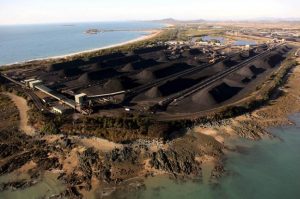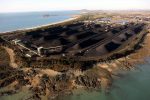 IS Malcolm Turnbull determined to lose the 2019 election? His statement this week that the Government could underwrite the rail line for the Adani mine would have increased the anger among small businesses in the six Reef Seats.
IS Malcolm Turnbull determined to lose the 2019 election? His statement this week that the Government could underwrite the rail line for the Adani mine would have increased the anger among small businesses in the six Reef Seats.
They are already reeling from two destructive bouts of cyclones and floods and see their long-term future horribly compromised by coral bleaching on the Great Barrier Reef. So along comes the Prime Minister giving support to the one thing that most threatens their livelihoods – the proposed massive Adani central Queensland thermal-coal mine.
Two of the Reef Seats are the most marginal in the Parliament: Labor holds Townsville-based Herbert by just 0.02% and the LNP holds Capricornia by just 0.63%. Three others are held by the LNP by under 4%: Flynn on 1.04%; Dawson on 3.34%; and Leichhardt on 3.95%. The other Reef Seat, Kennedy, is comfortably held by Bob Katter who heads his own party.
Turnbull is deluded if he imagines the plaudits he gets from big business and Big Fossil will outweigh the opprobrium and fury he will create among the thousands of small businesses that depend on the Great Barrier Reef.
I went to a meting about the mine in Port Douglas this week. There was a strong under-current of: “I am no tree-hugging greenie, but my small business is under threat for no good reason.”
All of the Reef Seats have coastal towns and cities (or parts of a city) that are more dependent on tourism and agriculture than mining, which threatens both.
Mining always exaggerates the jobs it creates. It likes to pretend the short-term establishment jobs last through the whole project. Adani is a case in point. Better estimates suggest that Adani will create just 1400 full-time equivalent jobs through the life of the mine. But even exaggerated mining claims are dwarfed by tourism employment.
The Great Barrier Reef provides 69,000 full-time-equivalent jobs directly and indirectly.
According to a 2013 report to the Federal Government, “A high proportion of the value-added and employment generated emanates from tourism activity, with almost $5.2 billion in value added and about 64,000 FTEs generated by the tourism sector.”
The trouble is that the mining industry has just a few powerful players with a single voice and a lot of money, so it can influence government easily – witness the piddling $22 million they spent on advertising to make the then Labor Government back away from its Minerals Resource Rent Tax.
Tourism, however, has thousands of people running small businesses with no spare time or money to look after their own interests. It expects government (especially a Government that says it is pro-small business) to do that for them.
But as we have seen recently in western democracies, there are few rusted-on voters any more. It will be a foolish gamble to pander to Big Fossil when there is a seething groundswell of discontent.
Turnbull suggests that the Federal Government, via the Northern Australia Infrastructure Facility, can give Adani a cheap loan of nearly $1 billion to build a railway that only Adani can use. That is $750,000 per job. Lots of businesses in northern Australia could find better ways to use that money, including replacing cyclone- and flood-destroyed infrastructure.
It is an appalling misuse of government funds on legal, economic and environmental grounds.
NAIF is legally supposed to be for infrastructure projects in the public interest and for projects that would not otherwise be built. The one-user railway for a company that says it can fund its project itself simply does not qualify.
Resource companies have a history of paying pitifully low rates of tax. They just grab our resources and sell them overseas for the benefit of foreign shareholders.
A good example earlier this month was the Chevron tax case. Chevron US raised $2.5 billion at 1.2% and “lent” it to its Australian arm at 9%, which the Australia arm claimed as a tax deduction, more or less reducing its taxable income in Australia to zero. They all do it. Mercifully, the Full Federal Court upheld the ATO’s rejection of the deduction and its $300 million tax assessment.
The main objection to the Adani mine is that it is for brown (or thermal) coal which is only good for electricity generation. There are far cleaner and cheaper renewable alternatives which will ultimately make this mine as uneconomic as the Hazelwood brown-coal power station. China is winding back brown-coal power stations and pushing ahead with solar.
Three of the four main banks say they will not go near it. Only Westpac has not ruled it out. (Who would want to bank with a bank that has such foolish and/or immoral lending practices?)
The world should stop thermal-coal mining. The world should be preserving its very limited capacity for fossil fuel burning for things which have no alternative – such a coking coal for steel production.
We used to think that Australia is too small to significantly affect the world’s carbon output and through it global warming. Adani, as the biggest potential coal mine in Australia’s history and one of the world’s largest, changes that.
And Australia has more to lose than most countries through global warming, especially the Great Barrier Reef.
Even if all the coal is exported to India, it is immoral to put Indians through the health hazards of burning coal seen in Britain in the 1950s and Beijing now.
This is an Indian company proposing to export its product to India which will create precious few jobs and pay precious little tax, yet will use 26 million litres of water a day and directly affect the reef through dredging requirements at port and indirectly affect it through climate change.
It makes Turnbull’s put-Australia-first slogan look like hypocritical jingoism.
Given thermal coal’s damage to the planet and the health of humans on it, it makes about as much sense as mining asbestos. Thermal coal and asbestos used to look useful and economic in the short-term. But we now know that in the long-term they cause more harm than they are worth and there are alternatives for both.
Meanwhile, Queensland Labor seems to want to tick all the Adani approval boxes before the next state election. Federal Labor, which opposes funding the railway, should go further if it wants to cement in five of the critical Reef Seats. It should promise to ban the mining of thermal coal in Australia by refusing export licences. That alone would put a stop to Adani.
CRISPIN HULL
This article first appeared in The Canberra Times and other Fairfax Media on 29 April 2017.
 IS Malcolm Turnbull determined to lose the 2019 election? His statement this week that the Government could underwrite the rail line for the Adani mine would have increased the anger among small businesses in the six Reef Seats.
IS Malcolm Turnbull determined to lose the 2019 election? His statement this week that the Government could underwrite the rail line for the Adani mine would have increased the anger among small businesses in the six Reef Seats.
The next election will not be in 2019. Turnbull (and a certain media conglomerate) will be bombarding us with national security issues, Nth Korea + China are the new children overboard. Expect another DD next year.
Losing a DD is more palatable than losing a general election. Turn off your TV and radio (or tune to sbs chill), the shock jocks are coming.